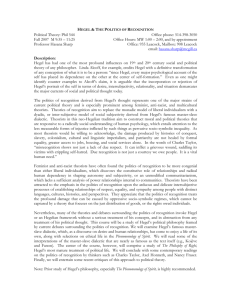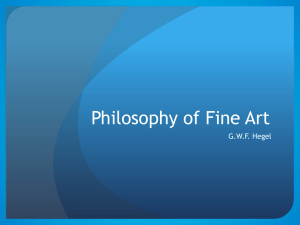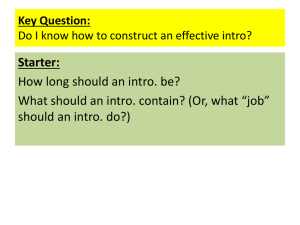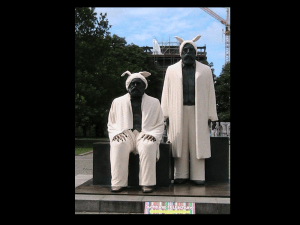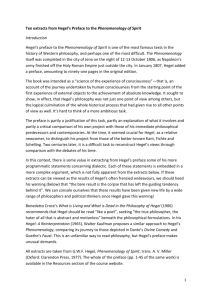Dialectic Dictionary Definition:
advertisement
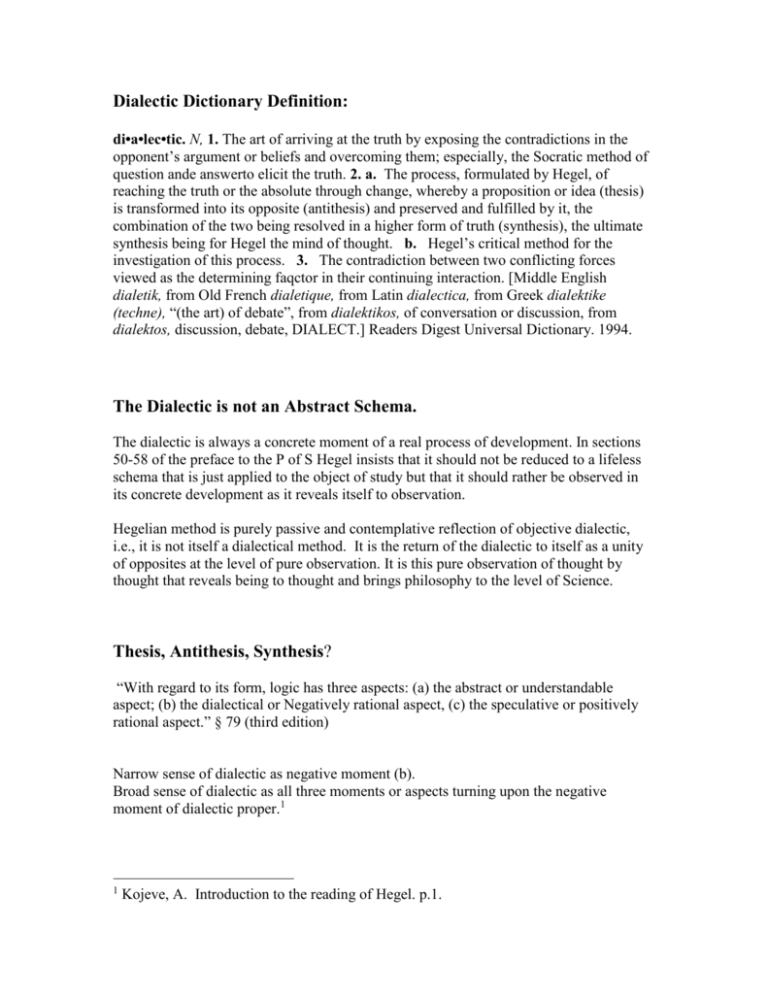
Dialectic Dictionary Definition: di•a•lec•tic. N, 1. The art of arriving at the truth by exposing the contradictions in the opponent’s argument or beliefs and overcoming them; especially, the Socratic method of question ande answerto elicit the truth. 2. a. The process, formulated by Hegel, of reaching the truth or the absolute through change, whereby a proposition or idea (thesis) is transformed into its opposite (antithesis) and preserved and fulfilled by it, the combination of the two being resolved in a higher form of truth (synthesis), the ultimate synthesis being for Hegel the mind of thought. b. Hegel’s critical method for the investigation of this process. 3. The contradiction between two conflicting forces viewed as the determining faqctor in their continuing interaction. [Middle English dialetik, from Old French dialetique, from Latin dialectica, from Greek dialektike (techne), “(the art) of debate”, from dialektikos, of conversation or discussion, from dialektos, discussion, debate, DIALECT.] Readers Digest Universal Dictionary. 1994. The Dialectic is not an Abstract Schema. The dialectic is always a concrete moment of a real process of development. In sections 50-58 of the preface to the P of S Hegel insists that it should not be reduced to a lifeless schema that is just applied to the object of study but that it should rather be observed in its concrete development as it reveals itself to observation. Hegelian method is purely passive and contemplative reflection of objective dialectic, i.e., it is not itself a dialectical method. It is the return of the dialectic to itself as a unity of opposites at the level of pure observation. It is this pure observation of thought by thought that reveals being to thought and brings philosophy to the level of Science. Thesis, Antithesis, Synthesis? “With regard to its form, logic has three aspects: (a) the abstract or understandable aspect; (b) the dialectical or Negatively rational aspect, (c) the speculative or positively rational aspect.” § 79 (third edition) Narrow sense of dialectic as negative moment (b). Broad sense of dialectic as all three moments or aspects turning upon the negative moment of dialectic proper.1 1 Kojeve, A. Introduction to the reading of Hegel. p.1. (a) Is the understandable or imaginable. The moment of Thought that is friendly to the senses. It is abstract because it is sensually concrete and therefore partial and one-sided. (b) Is the negation of this by some equally understandable and imaginable opposite understanding that is however a step beyond such understanding because it generates a failure of understanding in relation to (a). It is Negatively rational because it is only rational to the extent that it negates the understanding of (a) but it is itself an understanding of the same kind as (a) and so not something that is rational – i.e., beyond imagination. (c) Is the speculatively positive moment of Thought’s return to itself as reason, and being rational is being actual and the actual is the mystical – i.e., non-imaginable. We can think it but we cannot understand it. It is the negation of the negation – of (b)’s negation of (a) - and hence positive, rather than merely negative, rationality. Logic here is the object revealed in, and by, thought. The three moments are moments of Being itself as it exists for us – i.e., not moments of pure and simple Being as it exists outside all relation to thought,2 but Being as it is realised in thought – in the sense of both being comprehended and constituted by thought. It is because being is comprehended and constituted as part of the selfsame process that it cannot be imagined, since to do so would be to step outside being and its coming to be, and grasp it either as pure intuition, or inference, and this would be to lapse back into one-sided and abstract thinking. “The structure of thought, therefore, is determined by the structure of the Being that it reveals.”3 Objective and subjective dialectic. “[W]e cannot answer such questions as ‘what does the dialectical movement consist in?’ by giving an argumentative equivalent in ordinary discourse; the experience of Thought is an ineliminable feature of the dialectical progress, and, moreover, cannot be given an equivalent in the ordinary propositional form.” The historical dialectic is then a unity of subject and object in their mutual development but this is not a simple plurality, but has as its ultimate beginning and end the Spirit’s own self-development and self-realisation, it has a single subject and is then a Monist rather than pluralist philosophy. The unity of opposites: 2 3 Ibid. p.2. Ibid. “On those stepping into rivers staying the same other and other waters flow.” Heraclitus. DK22B12. Hegel remarks in his essay on Heraclitus that: “Here we see land; there is no proposition of Heraclitus which I have not adopted in my own Logic.” Lectures on the History of Philosophy. D. Heraclitus. P.1. The meaning of Heraclitus’ statement can be seen as entailing that the identity of the River is the unity of sameness and difference in dynamic tension with one another. In The science of Logic Hegel talks of “[T]he identity of identity and non-identity” “The analysis of the beginning would thus yield the notion of the unity of being and nothing — or, in a more reflected form, the unity of differentiatedness and nondifferentiatedness, or the identity of identity and non-identity.” Science of Logic. § 112. We could analyse the idea of the river as follows: The identity of the river is a unity of opposites those of being and not-being the river. Both the banks and the water contain an aspect of their respective opposites in themselves. So the banks impart to the continuous flowing of the water that both is and is not the river an element of determinateness/ being the river and the flowing of the water imparts to the being of the banks an element of indeterminatness/not-being banks due to their erosion by the water. The unity of these two mutually assuming opposites is the whole – namely the river. The river is the mutual becoming of the two opposed forces. The connection with Heraclitus – A pre-Socratic philosopher - is related to Hegel’s idea that the truth is the whole which entails that reality has objective contradictions - things both are and are not self identical. This conflicts with Aristotle’s anti-Heralitean argument that the same thing cannot both be and not be at the same time and in the same respect. “For the same thing [attribute] to hold good and not to hold good simultaneously of the same thing [subject] and in the same respect is impossible (given any further specifications which might be added against the dialectical difficulties).” Metaphysics IV.3. 1005b.19-20. This formulation defines the respect in which something may not both be, and not be, as a single attribute of a thing. The principle of non-contradiction is thus tailored to fit things considered/analysed into parts of a whole. When we consider a thing in relation to the whole of which it is a part however, as opposed to thinking of it as isolated in itself, then the respect in which it is a part of that whole is inherently contradictory.4 4 Cf. Danaher, J. ‘The Laws of Thought.’ The Philosopher, vol. LXXXXII No.1. This attitude towards contradiction as being something in the object rather than being simply an error of thought is thus a break with a long tradition that was given its most influential formulation by Aristotle. The dominant and Subordinate moments: As in the master Slave Dialectic there is a dominant and a Subordinate moment within any dialectical relationship. But this too contains a unity of opposites in that the Master is in one - obvious - sense the dominant moment, but in another the subordinate moment and the slave vice versa. The master is Dominant inasmuch as he consumes what the slave produces but he is at the same time subordinate inasmuch as it is the slave, in his labour for the master, to whom falls the moment of self-recognition. That slave thus in a less obvious sense is the dominant moment in that he overcomes the relation of otherhood and turns it into a relation of brotherhood thereby transfiguring the master/slave relationship. Dialectic – in a Nutshell: The mutually creative interaction of mutually excluding, mutually including phenomena. Q. How can something be both exluding and including? To grasp this is to grasp the dialectic. We can picture the ‘either’ and we can picture the ‘or’ but we cannot picture ‘both’. We can only grasp this dialectically. So you may notice that you need the dialectic to grasp the ‘definition’ of the dialectic. In fact you cannot ‘define’ the dialectic at all, you can at most demonstrate it as flowing out of the concrete phenomena. In Hegel process assumes a positive ontological, logical and epistemological significance. Becoming and Being are equally real and cannot be understood independently of one another, but that previous philosophers tried to separate these two aspects is seen by Hegel as a necessary stage in the development of knowledge. Mistakes of philosophy that are not the result of straightforward logical inconsistency or incoherence - i.e., errors of reasoning – result in the kind of contradictions that are not wholly negative but are simply one-sided reflections of reality. In the face of such contradictions Hegel says that both are true and false in equal measure. They are false in as much as they take their onesided truth as the whole truth and try to exclude or neglect the truth of the other. The Dynamic Nature of Categories: You don’t have to do metaphysics to find these kind of contradictions, take Darwin for example: First he began collecting and classifying creatures into genus and species according to an idea of the Being of natural kinds, then he eventually came up with a theory of evolution that completely undermines the whole idea of natural kinds and conceives of species as a continually evolving, everchanging process, of becoming that results in that species becoming another kind of thing – another species. The idea of what a species is develops an internal contradiction that emerges out of a previous more basic, one-sided, conception. Species are both species and not species. The negative moment here – their becoming not-this-kind - is an essential driving principle of their being species at all. A lion, for example could be defined as that which has the capacity to become a not-lion. Only lions can become not-lions. The negative moment is a determinate not-being rather than an abstract not. The first one-sided concept of species as a certain kind of Being is a necessary stage in its own dissolution into a conception of its being as a becoming a not-being. This is the identity of identity and non-identity. The category ‘species’ has, in the process, itself been modified. In dialectics the categories themselves as well as the things that they categorise are subject to change. Thought is conceived of as a Becoming as well as the object comprehended. Through conceiving of the object as a Becoming thought conceives of itself and its categories as a Becoming. This dynamic nature of the categories of reason is also a break with a long philosophical tradition. Categories of analysis are static whereas those of synthesis are dynamic. The Unity of Thought and Being. Dialectic is thus an inherently historical unity of the world becoming understood, and the understanding of the world as one and the same thing. For Hegel this is ultimately the Spirits own self-realisation through its own dismemberment. Pof S. §32. “But the life of Spirit is not the life that shrinks from death and keeps itself untouched by devastation, but rather the life that endures it and maintains itself in it. It wins its truth only when, in utter dismemberment, it finds itself. It is this power, not as something positive, which closes its eyes to the negative, as when we say of something that it is nothing or it is false, and then, having done with it, turn away and pass on to something else; on the contrary, Spirit is this power only by looking the negative in the face, and tarrying with it. This tarrying with the negative is the magical power that converts it into being. This power is identical with what we earlier called the Subject, which by giving determinateness an existence in its own element supersedes abstract immediacy, i.e. the immediacy that barely is, and thus is authentic substance: that being or immediacy whose mediation is not outside of it but which is this mediation itself.” The tarrying with the negative is the means by which thought generates the content from within itself that is the making real of the real to itself in and through itself. The Subject object dialectic ends in a point where the subject/object dialectic becomes the subject/subject. The whole process is one of the subject/spirit achieving the recognition of itself as itself in and through its negation in the object (the object/nature being the negative moment of itself) and the eventual negation of this negation, i.e. the realisation of this otherness of spirit in the subject/object relation of identity and nonidentity as an opposition existing as the identity of spirit as a whole. Spirit as substance/subject in-itself has realised itself as the identity of subject and substance foritself. Mediation: Mediation and immediacy are both equally real “There is nothing, nothing in Heaven or in Nature or in Spirit, which does not contain equally both immediacy and mediation, so that these two determinations show themselves inseparable and united, and the opposition above shows itself to be null.” Just because something is more mediated doesn’t mean to say that it is less true. Mediation is achieved through teleological stimulus of self-development inner contradiction pointing to a higher, richer, more determinate form. Mediation is inner contradiction not external arbitration of an external contradiction. If the thesis were ‘white’ and the antithesis ‘black’ the synthesis wouldn’t be ‘mid-grey’ but something like ‘colour’. Synthesis is always a creative mediation, it always generates something new and comprehends as it transcends. A synthesis is more than the sum of its parts. “[E]ven the transition to a mere proposition contains a becoming-other that has to be taken back, or is a mediation. But it is just this that is rejected with horror, as if absolute cognition were being surrendered when more is made of mediation that in simply saying that it is nothing absolute, and is completely absent in the Absolute. 21. But this abhorrence in fact stems from ignorance of the nature of mediation, and of absolute cognition itself. For mediation is nothing other than self-moving selfsameness, or is reflection into self, the moment of the ‘I’ which is for itself pure negativity or, when reduced to its pure abstraction, simple becoming.[…]” Pof S. 20-21. “[…] mediation is merely the self negation, and the negation of this negation, involved in the self identification of the Subject. The subject only becomes an immediate unity through the denial of its mediate connection with something else.[…]” p.497. Pof S. Commentary on §21. Re: Descartes’ Cogito. There is a misconception about the nature of mediation that needs to be overcome in order that the dialectic can make any sense at all and that is that to be in a mediated relationship to something is to be simply one step removed from it. What it is necessary to realise is that to be in a mediated relationship to something is to be more deeply involved with that thing to interpenetrate with it rather than simply collide with it. As with the young boy who changes/realises himself as he changes/realises the world by disturbing the water of the pool. Synthesis. Synthesis is then the moment in the dialectic where the thesis is Aufgehoben = overcome. Three fold sense. 1. Annulment of abstract, subjective, one-sidedness. Overcoming of falsehood. 2. Preservation of their essential truth. 3. Sublimation of thesis and antithesis in their synthesis through the mediation of their bare opposition. “The truth is the Whole”: “The true is the whole. But the whole is nothing other than the essence consummating itself through its development.” P of S. Preface 20. The truth is not something that can be pictured. When we think of opposites we cannot picture something in reality as being both, rather than either/or. And likewise, we cannot picture each opposite producing its opposite from within itself. We think of them pictorially as absolutely excluding the other from themselves. E.g. The something is implicit in the nothing. The nothing is not empty but has something as an immanence within itself. P. 88 Rosen. This sounds mystical and indeed Hegel recognises this: “But as we have seen, the abstract thought of understanding is by no means something fixed and ultimate but shows itself as a constant setting aside [Aufheben] of its own self. Everything rational is thus equally to be called mystical – which is only to say that it extends beyond the understanding. But by no means is it to be regarded as something which is incomprehensible and inaccessible to Thought.” Encyclopedia. Para.82 Zusatz. Cited in Rosen. P.85. It is in this sense perhaps that Hegel notoriously states: “What is rational is actual, and what is actual is rational.” Philosophy of Right. P.24. cited in Rosen. P.79. This is why in the Introductory Lectures on Aesthetics he writes: “There is indeed a deeper form of truth, in which it is no longer so closely akin and so friendly to sense as to be adequately embraced and expressed by that medium.” P. 12. The negative moment by which something passes beyond itself to the not-self is an essential aspect of its self development and its return to itself as the realisation of itself. Unity, contradiction, creative opposition. Unity Duality, plurality. Creative opposition. resolution. The unity of the 1 and the 10 is achieved via an initial split within the 1 into a duality which is then mediated as a creative – as opposed to a bare – opposition and then achieves its resolution through a return to itself as a unity on a higher level. Spiral-like development. c a b Questions:- In the light of Hegel’s idea of contradiction as a mutually creative opposition constitutive of the essence of a thing: What is the nature of the real for Hegel? 1.To what extent is the Subject/Object relation equivalent to the Consciousness/being distinction? 1.a. Given that the subject of the phenomenology is spirit how is it not also substance? 1.b. If subject is substance, then how do we make sense of the reality of the object that it realises itself through? 1.c. If the object/nature is not itself substance i.e. something genuinely external and other to spirit - then is the self-development of the spirit a real need? (A real need being for something that you do not already have. Re: The myth of Narcissus for whom the moment of recognition cannot achieve its end since it is the recognition of the fact that he is his own object of desire.) What is the nature of the truth for Hegel? 2. What sense can we make of objective contradictions? 2.a. Is Hegel’s idea of contradiction the same or different from Aristotle’s? PNC. 2.b. And is it the same or different from the pre-Socratic ideas of contradiction? 2.b.If his idea of contradiction is the same as Aristotle’s then how can something be and not be in the same thing in the same respect and at the same time? 2.c. Is this an actuality of the thing or a potentiality of it? I.e. we can make sense of the same piece of wood being in its entirety both a table and a chair at the same time, the same respect if we are considering its potential to become a table or chair but can it be both in actuality? 2.d. Is it then, that the idea of contradiction that Hegel has in mind is different from that which is denied by the principle of non-contradiction (and analytic philosophy?)? 2.e. If so what is it and what is its ontological status? Bibliography. Aristotle. A New Aristotle Reader. J.L. Ackrill (ed.). Clarendon Press. Oxford. 1987. Danaher, J. The philosopher, Vol. LXXXXII No.1. http://www.atschool.eduweb.co.uk/cite/staff/philosopher/lawsofthought.htm Hegel. The phenomenology of Spirit. A.V. Miller. (Trans.) OUP. 1997. Hegel. The Science of Logic. http://www.marxists.org/reference/archive/hegel/index.htm Hegel. Introductory Lectures On Aesthetics. B. Bosanquet. (trans.) M. Inwood. (ed.) Penguin. London. 1993. Hegel. Lectures on the History of Philosophy. D. Hereclitus. http://www.marxists.org/reference/archive/hegel/ Kojeve, A. Introduction to the Reading of Hegel. Agora Paperback Editions. Cornell University Press. London. 1980. Readers Digest Universal Dictionary. 1994. Rosen, M. Hegel’s Dialectic and its Criticism. CUP. London. 1982.



